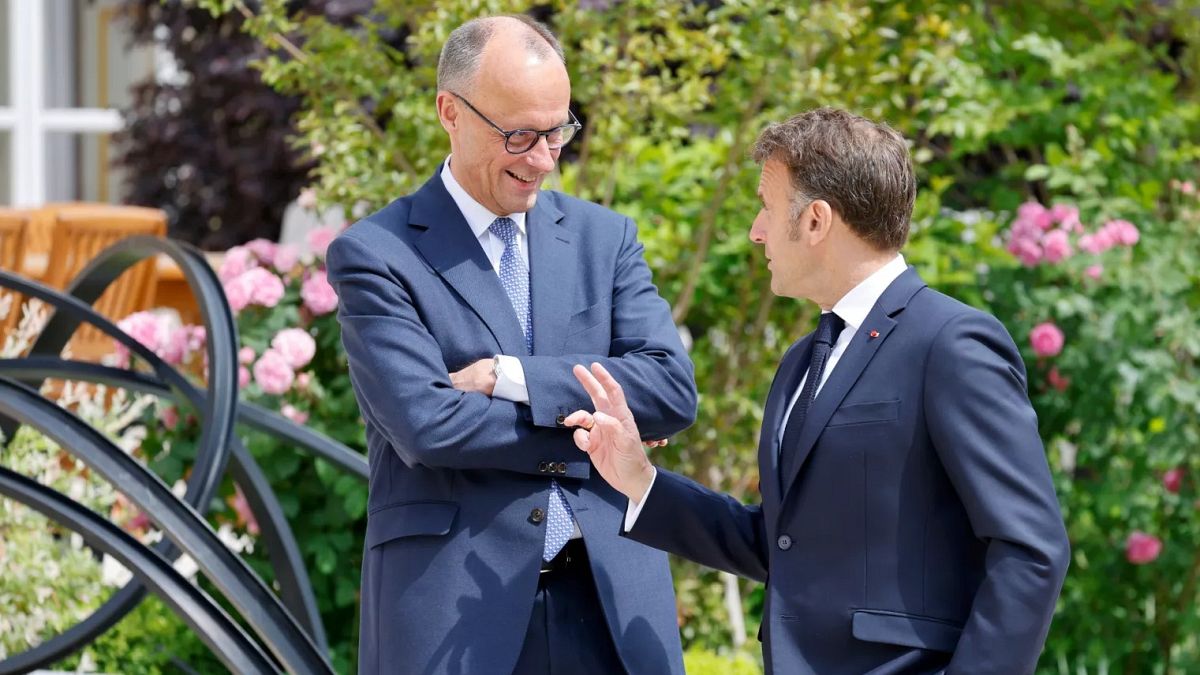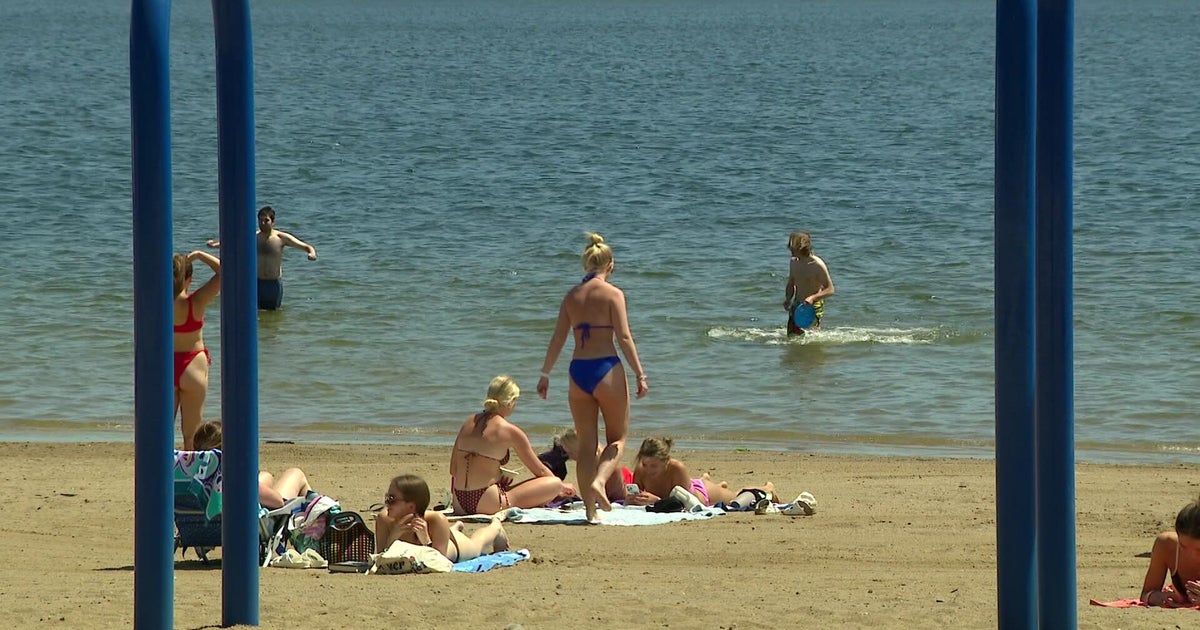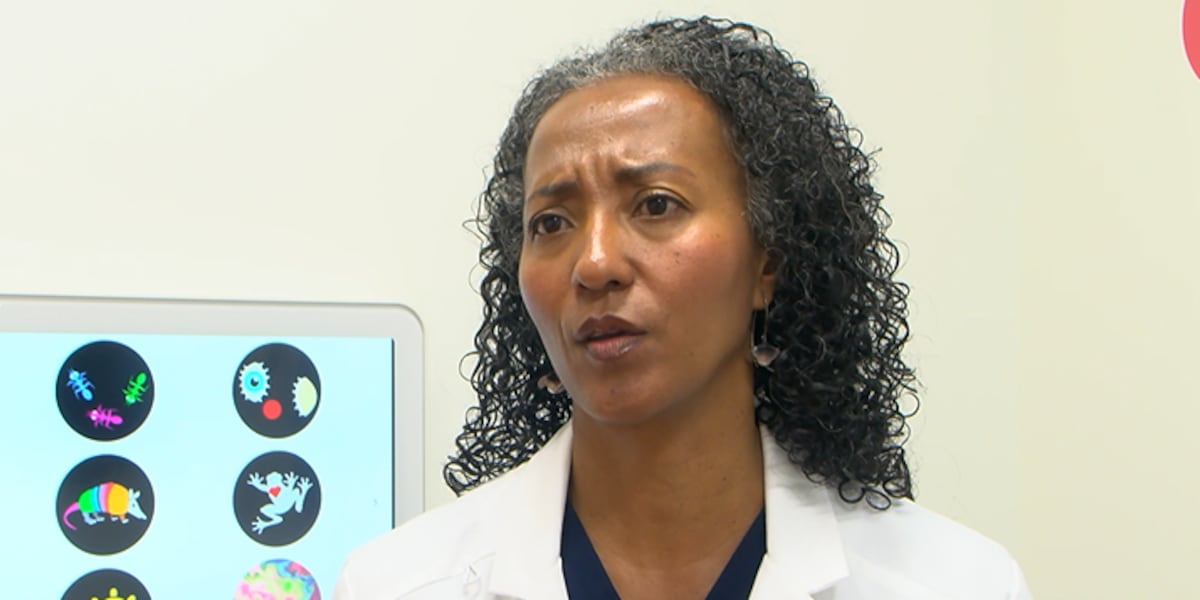World
Algae is a low-carbon protein. The EU is lagging in production
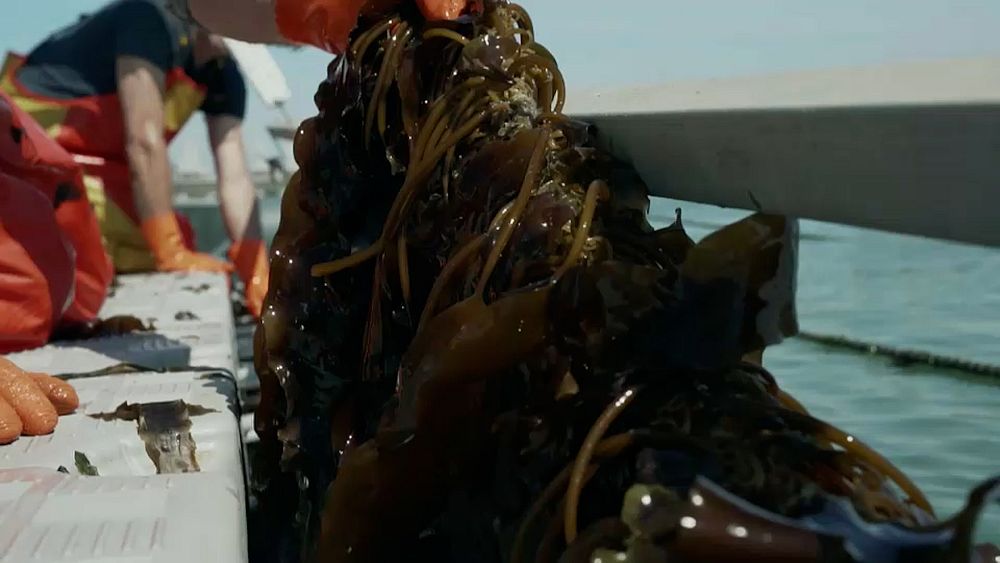
Aquaculture is seen as key to mitigating the challenges faced by the traditional fishing sector.
Aquaculture supplies only 20% of the European Union’s seafood consumption, much lower than the global average of 50%, which the European Commission and players in the industry hope to turn around.
The sector is being seen as key to mitigating the challenges faced by the traditional fishing industry based on catching wild species.
“We need to look for success stories of alternative economic uses of the sea that we can expand and share in European coastal areas and create new resilience jobs”, Virginijus Sinkevičius, the European Commissioner for the Environment, recently told Euronews.
“Being dependent only on fisheries and tourism is very risky for the blue economy. We saw this with the COVID-19 pandemic, which was a big blow for these sectors, which were basically shut down and people were left without income. The same thing happened with the Russian aggression in Ukraine, which had a huge impact on the prices of diesel used by boats. It was again a very difficult period for the fishing sector, which faced increasing operating costs,” Sinkevičius said.
The European Commission presented, last February, a package of measures to improve the sustainability and resilience of the EU’s fisheries and aquaculture sector and the European Parliament is also preparing a report about the last 10 years of the Common fisheries policy.
Pierre Karleskind, chair of the Fisheries Committee at the European Parliament, defends a balanced approach between economic uses and biodiversity protection.
“We are interested in this idea of maritime planning, where we can say that in that place we can fish, in another we must protect the ecosystems, or that that place we can also develop aquaculture. There’s room for everyone, we just need to get around the table, work with the researchers and get everyone, including the fishermen, moving in the right direction,” the French liberal MEP told Euronews.
The potential of algae
The EU Blue Economy 2023 Report, launched last week, states that algae are key to this new approach, generating €10 million in turnover in France, Spain and Portugal, where they are developing rapidly.
Worldwide, algae are mainly cultivated and over 97% of all production comes from Asia, with Chinese production accounting for 57% of the total. The EU imports most of what it uses in various industries, from food to pharmaceuticals and cosmetics, and now even textiles. There has also been some harvesting of wild stocks and aquaculture systems are becoming more common.
“Europe currently imports around €600 million a year in algae-based products and the aim is to reverse this activity. There are currently around 80 companies engaged in seaweed aquaculture, spread across several European Union countries, with production focused mainly on four types of algae that allow this sector to develop in both northern and southern Europe,” Helena Abreu, Vice-president of the International Seaweed Association, told Euronews.
But there is still much to be done in terms of facilitating access to the marine space, in order to identify the best locations for these farms, as well as mechanisms to support technology transfer from research to the market and also raising public awareness by creating information and marketing strategies. The professionals are now calling for better regulation of this low-carbon protein.
“On a regulatory level, we want fair competition, we want the rules to be the same for all. Europe can provide this framework, first of all. We want easy access to sea or seawater, whether on land or at sea, and to encourage the creation of companies,” Jean-Baptiste Wallaert, President of the French Union for Algae and Marine Plants told Euronews.
“We want the list of algae that can be used to be a little longer: in Brittany, we have 700 species of algae, but for human consumption, we only have 40 authorised species,” he added.
The European Commission has previously promised to put in place actions to support this sector, notably by “funding pilot projects for career reorientation and supporting SMEs and innovative projects in the algae sector” and “conducting studies and debates to better understand the role of algae” in the economic sustainable production and strategies to tackling climate change.

World
Top US Senate Democrat to block Trump DOJ nominees over Qatar airplane

World
Self-proclaimed 'king of Germany' arrested in plot to overthrow government

The self-styled “king” of Germany and three of his senior “subjects” were arrested for attempting to overthrow the state, according to media reports.
Peter Fitzek, 59, was taken into police custody during morning raids conducted Tuesday in seven German states, the BBC reported.
Fitzek’s group, the Reichsbürger, or “citizens of the Reich,” has also been banned by the government.
TRUMP CELEBRATES CONSERVATIVE PARTY WIN IN GERMANY
Peter Fitzek, the self-proclaimed head of the so-called “Kingdom of Germany,” poses for a photo with the kingdom’s constitution in Wittenberg, Germany, Oct. 23, 2023. (Jens Schlueter/AFP via Getty Images)
The group’s aim is to establish the Königreich Deutschland, or “Kingdom of Germany.”
“I have no interest in being part of this fascist and satanic system,” Fitzek previously told the news outlet in a 2022 interview.
Reichsbürgers reportedly have their own currency, flag and identification cards and want to set up separate banking and health systems.
The Reichsbürger undermined “the rule of law,” said Alexander Dobrindt, Germany’s interior minister, by creating an alternative state and spreading “antisemitic conspiracy narratives to back up their supposed claim to authority,” the news report states.
GERMANY’S NEW LEADER LOOKS TO DISTANCE EUROPE FROM TRUMP
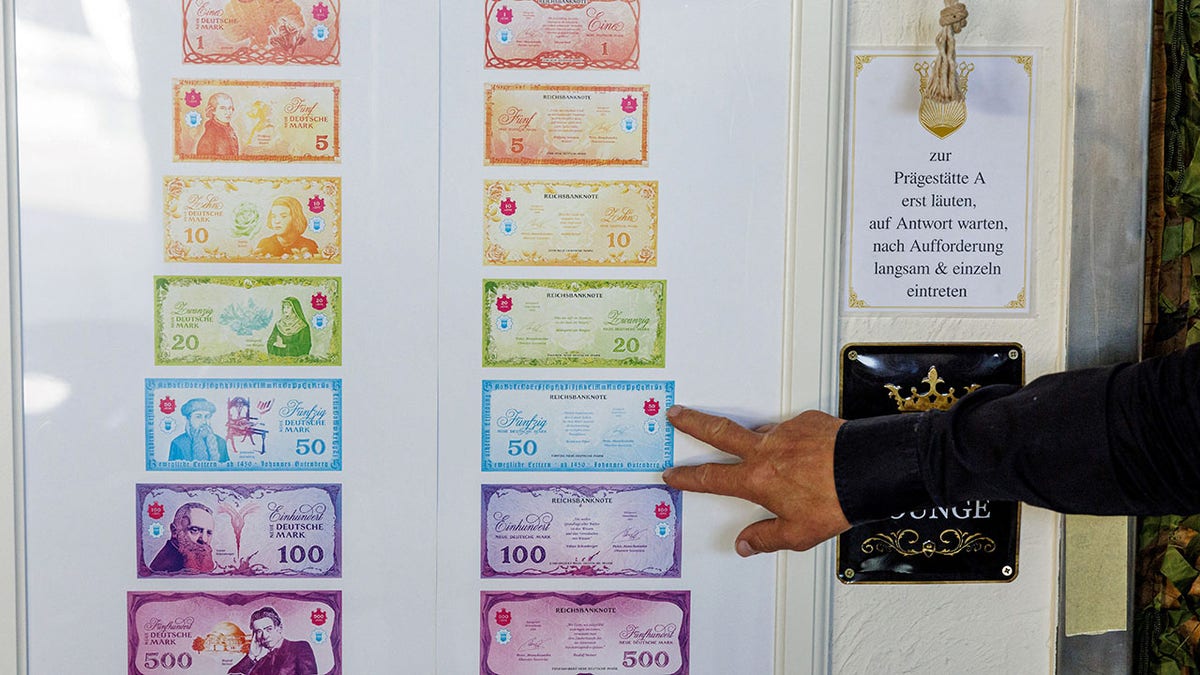
Peter Fitzek, the self-proclaimed head of the so-called “Kingdom of Germany,” shows the paper currency he created himself in Wittenberg, Germany, Oct. 23, 2023. (Jens Schlueter/AFP)
He said the group finances itself through crime.
Fitzek, who claims to have thousands of “subjects,” denied having violent intentions but also called Germany “destructive and sick.”
In 2022, dozens of people associated with the Reichsbürger were arrested for plotting to overthrow the German government in Berlin. They were accused of planning a violent coup, which included kidnapping the health minister in an effort to create “civil war conditions” to bring down German democracy, according to the BBC.
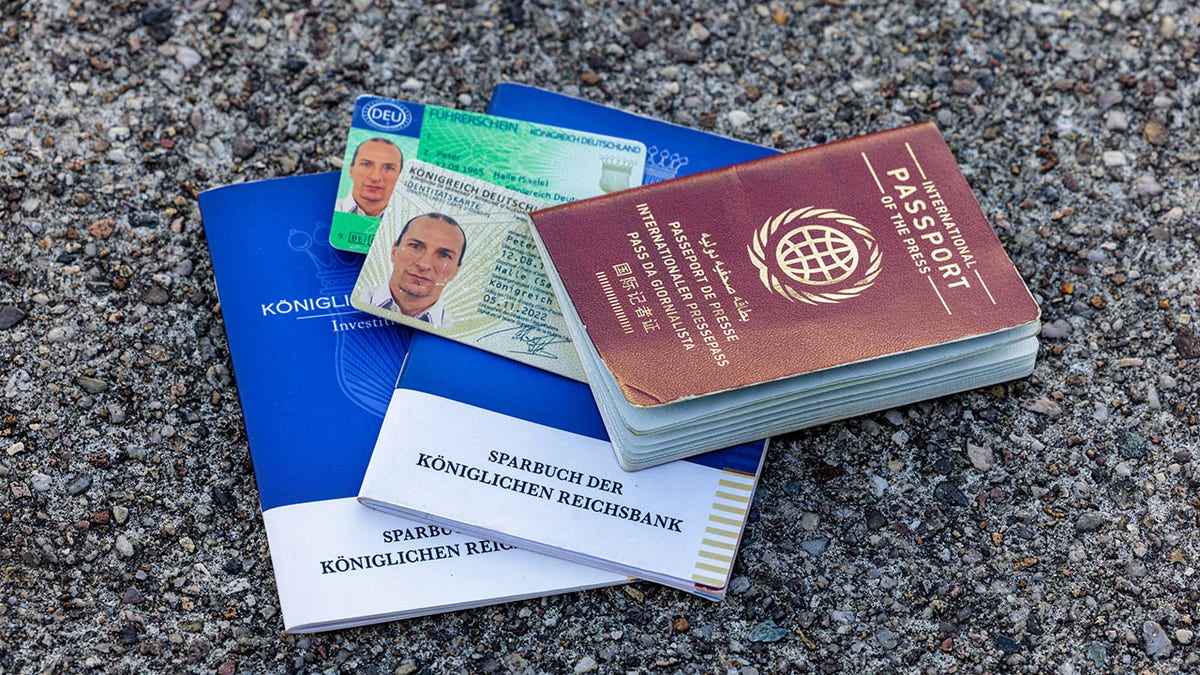
Self-made identity and banking documents of the so-called “Kingdom of Germany” are pictured in Wittenberg, Germany, Oct. 23, 2023. (Jens Schlueter/AFP via Getty Images)
Once dismissed as eccentric by critics, the group is now seen within Germany as a serious threat as the far right has grown politically over the past decade, the report said.
World
Costa calls for reforms in Bosnia to ensure EU membership progress
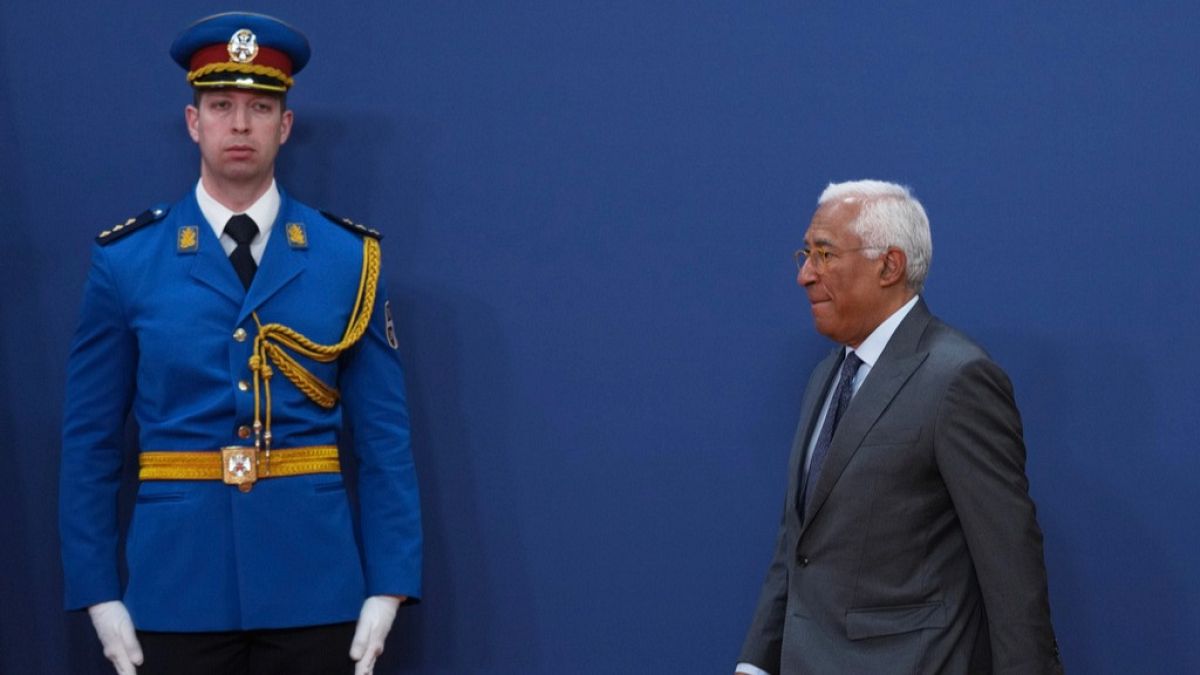
After his trip to Belgrade, European Council President António Costa visited Sarajevo on Tuesday as part of his Balkans tour. He was given a warm reception upon his arrival before meeting with Bosnia’s presidency.
In a statement, the European Council chief announced that the EU “remains committed” to the country’s European future. He also praised Željka Cvijanović, Denis Bećirović, and Željko Komšić — members of the Western Balkan country’s three-way presidency — for their role in maintaining stability and security in the country and the region.
Recently, tensions have been brewing domestically over the leader of the entity of the Republika Srpska (RS), Milorad Dodik’s actions, which the state-level authorities denounced for undermining the country’s constitutional order.
Western powers and the EU have condemned Dodik for his provocations after he had suggested that the Dayton Agreement, the peace agreement that formally ended the Bosnian War in 1995, had outlived its purpose.
In his statement, Costa underlined the importance of the Dayton accords, set to mark its 30th anniversary this year.
“And this year, on the 30th anniversary of Srebrenica genocide and the Dayton (and) Paris Agreement, I believe that it is an important message to remember,” said Costa.
Costa also outlined that some reforms are needed to ensure Bosnia remains on the path to EU membership.
“We need the approval of two judiciary laws, the appointment of a chief negotiator, and the adoption of the reform agenda to move towards on the Bosnia and Herzegovina in the European path.”
Bosnia is the only country that does not benefit from the EU’s Growth Plan for the Western Balkans. Costa stressed that implementing these reforms is of paramount importance to ensure that Bosnia’s citizens benefit from the EU plan.
“I would like to see Bosnia and Herzegovina joining the other Western Balkans partners in profiting from all that the European Union has to offer,” the Council president noted.
Costa will next travel to Montenegro and Albania on Wednesday, for meetings with President Jakub Milatović in Podgorica and President Bajram Begaj in Tirana. He’ll conclude his tour with a visit to Skopje in North Macedonia, where he will meet Prime Minister Hristijan Mickoski.
Additional sources • AP
-

 Austin, TX3 days ago
Austin, TX3 days agoBest Austin Salads – 15 Food Places For Good Greens!
-

 Education1 week ago
Education1 week agoIn Alabama Commencement Speech, Trump Mixes In the Political
-

 Technology1 week ago
Technology1 week agoBe careful what you read about an Elden Ring movie
-

 Culture1 week ago
Culture1 week agoPulitzer Prizes 2025: A Guide to the Winning Books and Finalists
-

 Education1 week ago
Education1 week agoUniversity of Michigan President, Santa Ono, Set to Lead University of Florida
-

 World5 days ago
World5 days agoThe Take: Can India and Pakistan avoid a fourth war over Kashmir?
-

 Technology5 days ago
Technology5 days agoNetflix is removing Black Mirror: Bandersnatch
-
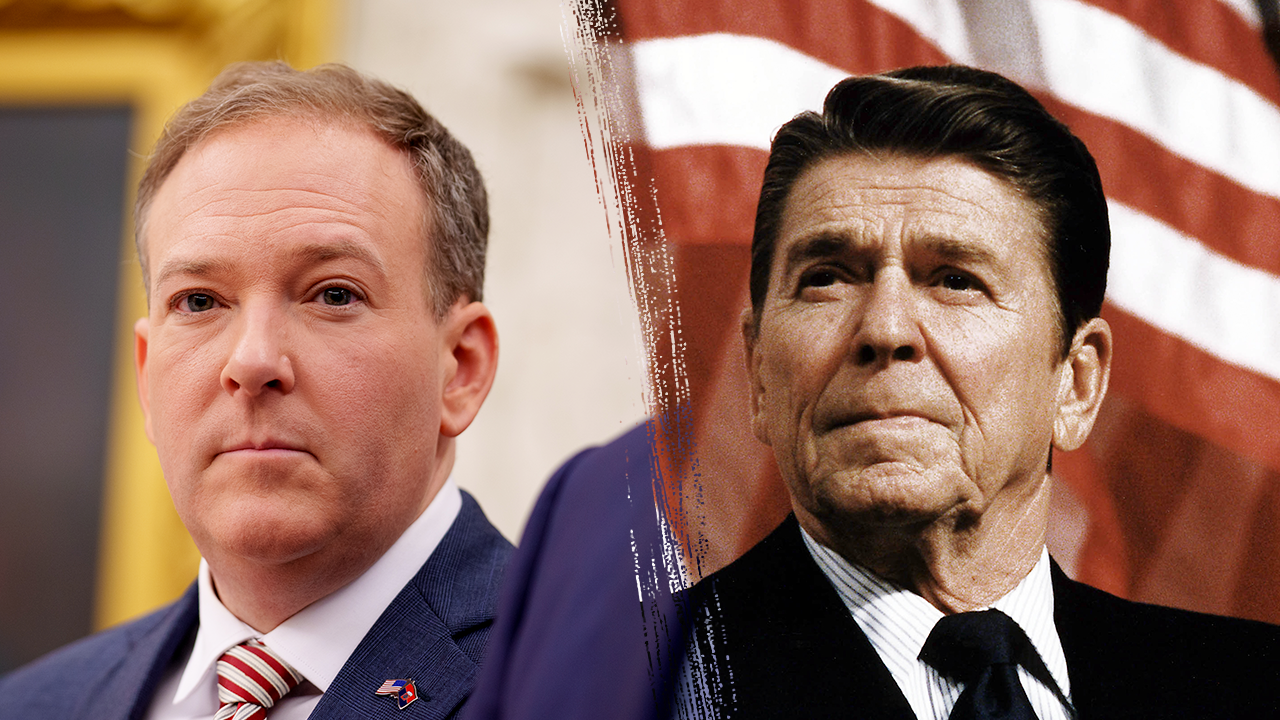
 Politics1 week ago
Politics1 week agoEPA chief Zeldin announces overhauls to bring agency back to Reagan-level staffing
